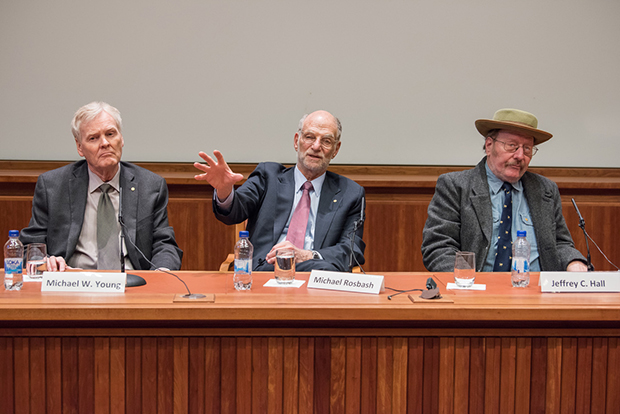Rosbash, Hall and Young answer questions about circadian rhythms at Nobel press conference
Nobel laureates answer questions about what cures jet lag (spoiler alert: nothing but time) and how circadian rhythms work for those without sight.
 Photos/Bengt Nyman
Photos/Bengt NymanWinners of the 2017 Nobel Prize in Physiology or Medicine, from left to right: Michael Young, Michael Rosbash and Jeffrey Hall
Nobel laureates met the media on Dec. 6 and 7 at press conferences at The Karolinska Institute, Sweden’s premier medical university. Among them on Wednesday were Brandeis’ Michael Rosbash and Jeff Hall, and Rockefeller University’s Michael Young, the three winners of this year’s prize for Physiology or Medicine.
The three answered questions primarily about circadian rhythms, the focus of their research.
Q: Do Rosbash and Hall have jet lag?
Yes. Hall said the body takes roughly one week to adjust to a six-hour time difference, the number of hours Sweden is ahead of the East Coast. “We will be in sync with northern European, Scandinavian time in approximately one week,” Hall said, “at which point we will be going home.” Hall lives in Maine.
Rosbash said he’s tried a number of treatments for jet lag, all to no avail. “I suffer miserably,” he said. “There’s no terribly good therapy for jet lag. If there were, somebody would be making some serious money.”
Q: What advice do they have for young people?
“The challenge for young people is to find something you’re passionate about,” Rosbash said. “If you’re not successful, then you have to do something else, but at least give it a chance so when you’re our age, you don’t look back and say, ‘I wish I had tried to be a writer or a dancer or a musician.’ At least try.”
He added, “Don’t be afraid of failure.”
Q: Do the blind have circadian rhythms?
They explained that the body’s master biological clock works whether you can see or not. Via evolution, it became hardwired into our cells around 500 million years ago. Even when humans are in space or live in complete darkness, the body’s clock runs (or at least tries to run) in sync with the Earth’s daily rotation around the sun. It’s no different for the blind.
The problem is that the clock doesn't run exactly on a 24-hour cycle. Through a quirk of nature, it runs on a 24-hour and 15-minute cycle. Over time it falls out of sync with the sun. In the sighted, the body uses exposure to sunlight and darkness to reset the clock. It’s no different than when you travel to a different time zone, though it’s more subtle and you don’t notice it.
Hall said people who are completely blind have a very difficult time handling the 15-minute discrepancy. Their bodies’ clocks don’t adjust because they can’t discern and use sunlight to gauge the actual time. Rosbash said that after 48 days, their bodies operate as if they’re half-way around the world in a country that’s 12 hours ahead. It takes another 48 days for their master clock to show the right time again. However, some treatments, such as melatonin or eating at the exact same time every day, have been shown to be effective.
But Rosbash also said that at least half of the blind population can still discern enough sunlight to handle the 24-hour, 15-minute circadian-rhythm cycle. Recent research has shown that even in blind people the eye has photoreceptors for light that can be registered by the brain. “They see nothing but are circadianally functional,” Rosbash said.
Categories: Research, Science and Technology





